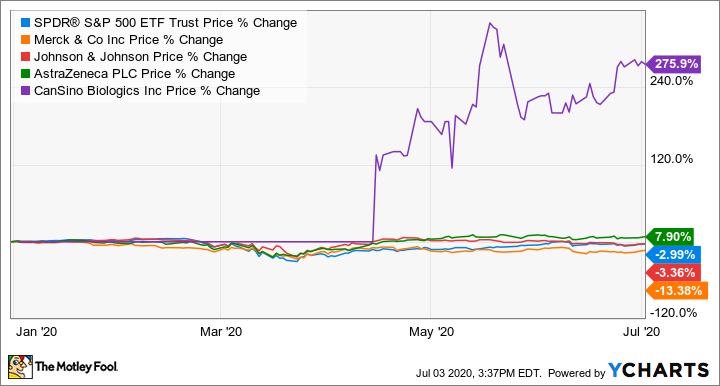Despite a worldwide race to develop a COVID-19 vaccine, China's CanSino Biologics (6185 2.51%) didn't make huge headlines when it announced last week that its COVID-19 vaccine candidate had been approved for widespread use among members of the Chinese military. Between the vaccine's small population of eligible recipients, its limited efficacy, and its intense side effects, nobody seems to be clamoring to license it for manufacturing outside China.
CanSino's stock price has also remained shockingly unperturbed by the company's breakthrough. Its highs from May show no sign of returning, and its trading volume remains nearly flat. Nonetheless, after the stock's triple-digit growth this year so far, investors are right to be fearful of missing out on future returns with CanSino or another COVID-19 vaccine stock.

Image source: Getty Images.
CanSino's Western counterparts may soon succeed where it failed
With a market cap of $6.5 billion and 16 vaccine candidates in development, CanSino was founded in 2009 but has only been listed on a stock exchange for around a year. The company conducts the majority of its vaccine-development operations in conjunction with public institutions in China ranging from universities to the military. But it has also collaborated with international biotech companies in the past.
It's unclear whether CanSino is profitable, though its lack of products on the market strongly suggests that it is not. So far, the company's only approved vaccine is its vaccination for Ebola, which is a niche product at best given that the last major Ebola outbreak is long gone.
Scientifically, CanSino's COVID-19 vaccine is based on an adenoviral vector. To make an adenoviral vector to fight COVID-19, researchers genetically engineer harmless adenoviruses to express a coronavirus protein, which is recognized by the immune system. Because the vector is a viral particle, it may prompt a better response from the immune system than a traditional vaccine, thereby producing longer-lasting and more effective immunity. However, while many adenoviral vector-based vaccines perform effectively in animal models, they have a history of not working as effectively in humans.
CanSino is far from the only company developing a COVID-19 vaccine using an adenoviral vector; AstraZeneca (AZN 0.19%), Johnson & Johnson (JNJ -0.46%), Merck, (MRK 0.37%) and several other large pharmas are taking the same approach. Unlike CanSino, it is improbable that these companies would settle for a vaccine candidate with side effects so severe that only healthy people in the military can risk being vaccinated, because to do so would heavily constrain the size of their market.
Furthermore, these major adenoviral vector vaccine competitors are significantly larger, more profitable, more internationally connected, and more experienced with vaccine development than CanSino -- and they also issue dividend payments, unlike CanSino. Given these factors and the market's lukewarm reaction to CanSino's vaccine moving into production, it might be wiser to invest elsewhere.
What's next for CanSino's COVID-19 vaccine?
CanSino's offering is very far from perfect, but no other COVID-19 vaccine manufacturer has matched CanSino's research and development tempo. As CanSino's vaccine appears to only generate immunity for about half of the people who take it, the company likely has a long road of optimization work ahead before it can move a more effective follow-up vaccine candidate into clinical trials. This implies that if another company can produce a better vaccine candidate, it could still beat CanSino to the mass market.
In short, investors should not react to CanSino's vaccine approval by buying the stock but rather by viewing the company's modest success as evidence that similar approaches by more established competitors have a credible chance of working. Investors should thus try to build a balanced portfolio of COVID-19 vaccine companies with a handful of different scientific approaches, rather than investing heavily in CanSino simply because its vaccine candidate appears to be moving forward the most rapidly.


